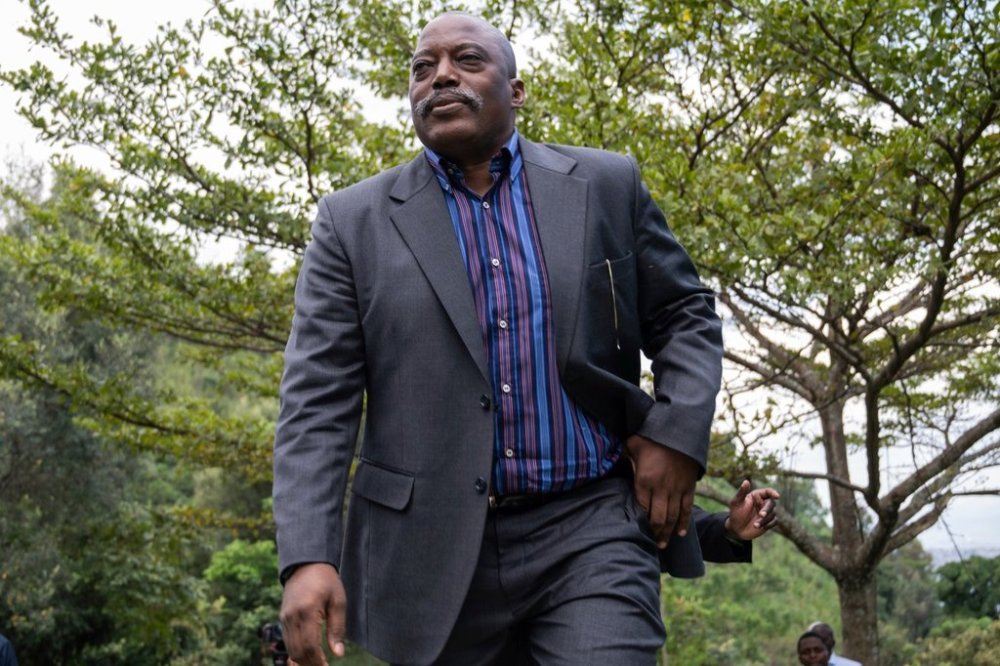Former Congo leader Kabila appears at Kenya political meeting despite absentia death sentence
Advertisement
Read this article for free:
or
Already have an account? Log in here »
To continue reading, please subscribe:
Monthly Digital Subscription
$0 for the first 4 weeks*
- Enjoy unlimited reading on winnipegfreepress.com
- Read the E-Edition, our digital replica newspaper
- Access News Break, our award-winning app
- Play interactive puzzles
*No charge for 4 weeks then price increases to the regular rate of $19.00 plus GST every four weeks. Offer available to new and qualified returning subscribers only. Cancel any time.
Monthly Digital Subscription
$4.75/week*
- Enjoy unlimited reading on winnipegfreepress.com
- Read the E-Edition, our digital replica newspaper
- Access News Break, our award-winning app
- Play interactive puzzles
*Billed as $19 plus GST every four weeks. Cancel any time.
To continue reading, please subscribe:
Add Free Press access to your Brandon Sun subscription for only an additional
$1 for the first 4 weeks*
*Your next subscription payment will increase by $1.00 and you will be charged $16.99 plus GST for four weeks. After four weeks, your payment will increase to $23.99 plus GST every four weeks.
Read unlimited articles for free today:
or
Already have an account? Log in here »
NAIROBI, Kenya (AP) — The former president of the Democratic Republic of Congo appeared in public Wednesday for the first time since being sentenced to death in absentia for treason and war crimes, meeting other leaders in Kenya in an attempt to establish a political group in opposition to Congo’s current president.
Joseph Kabila was filmed in Kenya’s capital, Nairobi, at a ceremony attended by a dozen other Congolese leaders who oppose President Felix Tshisekedi.
Kabila’s appearance in Kenya is expected to trigger diplomatic protests by Congo’s government, which has previously accused Kenya of supporting the Congo rebel group M23.

The group signed a declaration establishing a new political movement, which they said was aimed at saving the country. They claimed the goal was to reach “all Congolese people opposed to the dictatorship” and “end the tyranny, restore state authority, reestablish democracy and promote national reconciliation.”
Congo’s government in the capital, Kinshasa, accuses Kabila of collaborating with neighboring Rwanda and Rwanda-backed M23, which seized key cities in Congo’s mineral-rich eastern region in January in a lightning assault.
The People’s Party for Reconstruction and Democracy, which Kabila led while serving as president from 2001 to 2019, said the death sentence issued by the high military court Sept. 30 was politically motivated.
Kabila denies the allegations, but expressed support for the rebels’ campaign in a February opinion article in the South African newspaper Sunday Times.
Kabila came to power at age 29, taking over from his father, former President Laurent Kabila, who was assassinated in 2001 while still in office. When his term ended in 2017, Kabila extended his rule by delaying elections for two years.
Tshisekedi’s 2019 election marked the first peaceful transition of power in Congo since the country gained independence from Belgium in 1960. He entered an initial power-sharing agreement after failing to gain a parliamentary majority over Kabila’s opposition coalition, which still controlled Parliament and key institutions.
The relationship continued to sour until Kabila fled Congo earlier this year.

